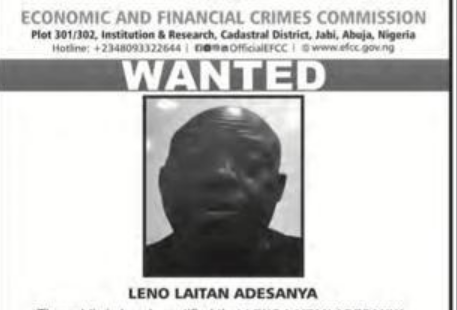In a stunning development, the Economic and Financial Crimes Commission (EFCC) has declared Leno Adesanya, the promoter of Sunrise Power and Transmission Limited, wanted over an alleged corrupt offer to public officers. This case has sent shockwaves through the business and political spheres, as it brings to light serious accusations of bribery, fraudulent contract awards, and significant financial misconduct linked to the Mambilla Hydropower project.
The saga surrounding Sunrise Power’s involvement in the Mambilla Hydroelectric Power Station project is emblematic of the corruption and malfeasance that has plagued Nigeria’s power sector for decades. The ongoing investigation into Leno Adesanya and the charges against former Minister of Power and Steel, Olu Agunloye, reveal a web of deceit and financial manipulation that threatens to undermine any semblance of accountability within the Nigerian government.
The Rise of Sunrise Power and the $6 Billion Mambilla Hydropower Project
Sunrise Power and Transmission Ltd, a company led by Leno Adesanya, entered the spotlight in 2003, when it was awarded a controversial $6 billion Build, Operate, and Transfer (BOT) contract for the Mambilla Hydroelectric Power Station. The contract was signed under the administration of former President Olusegun Obasanjo, but questions were raised almost immediately about its legitimacy, transparency, and the process by which it was awarded.
The Mambilla hydropower project was meant to be a flagship energy initiative, one that would address Nigeria’s chronic power shortages by generating over 3,000 megawatts of electricity. But instead of becoming a beacon of progress, the project became mired in controversy, accusations of corruption, and an ongoing battle for compensation after the federal government repudiated the agreement.
Adesanya’s Sunrise Power claims it was awarded the Mambilla contract after an extensive bidding process, but this assertion has never been fully substantiated. Instead, the Nigerian government has increasingly viewed the contract as part of a larger web of questionable deals that benefited corrupt individuals while offering little to Nigeria’s broader public interest.
For years, the project languished, marked by delays, budget overruns, and a lack of progress. It has now come to light that behind the scenes, Sunrise Power was allegedly involved in a web of corruption, using bribes to ensure that public officials, including Agunloye, were on board with the project and the contract terms.

The EFCC’s Role and the Charges Against Leno Adesanya
The EFCC has launched an aggressive probe into the conduct of Leno Adesanya and his company, Sunrise Power. According to the EFCC’s notice, Adesanya is wanted for “an alleged case of conspiracy and corrupt offer to public officers.” The charges against him are related to a series of financial transactions and payments made by Sunrise Power to key public officials, including the former Minister of Power and Steel, Olu Agunloye.
It is believed that Adesanya made significant payments to Agunloye to secure his support for the Mambilla Hydroelectric Power Station project, a development that directly influenced the outcome of the $6 billion contract. One of the most damning allegations involves a payment made in August 2019, when Agunloye allegedly received N3,600,000 through his Guaranty Trust Bank account from Sunrise Power for his approval of the Mambilla project.
The EFCC has stated that this payment is part of a larger conspiracy involving Sunrise Power, intended to corruptly influence public officers to approve the contract and ensure that the company received favorable treatment throughout the project’s execution. This revelation marks a key moment in a broader investigation that could implicate numerous individuals across Nigeria’s political and business elite.
This case is not just a financial scandal; it is a glaring illustration of the rampant corruption that has undermined Nigeria’s development for decades. While the country continues to struggle with energy shortages and the mismanagement of state resources, those in power have been able to line their pockets through illegal deals, leaving the Nigerian people to suffer.
The Alleged Corruption and Financial Mismanagement
At the heart of the corruption allegations against Sunrise Power is the alleged bribery of public officials to secure government contracts and avoid scrutiny. The EFCC’s investigation has uncovered evidence that the Mambilla Hydropower contract was approved through backdoor deals, where key officials like Agunloye were allegedly paid off to give their consent for a project that may have been doomed from the start.
The role of Leno Adesanya in these transactions raises serious questions about the ethics and legality of business practices in Nigeria’s energy sector. As a businessman, Adesanya has positioned himself as a key figure in the country’s power infrastructure, but it appears that his rise to prominence was aided by illicit financial dealings and corrupt practices. These actions are not just a violation of Nigeria’s laws; they are a betrayal of the trust placed in leaders and business figures to act in the best interests of the nation.
The N3.6 million payment made to Agunloye is just the tip of the iceberg. It is believed that other payments were made to various public officers over the years, helping to facilitate the continuation of the Mambilla project despite the mounting evidence of its fraudulent nature. These payments not only violated Nigeria’s anti-corruption laws but also robbed the country of the opportunity to develop a legitimate energy infrastructure that could have benefitted millions of citizens.
The Mambilla Project: A Breach of Trust and National Interest
While the Nigerian government is currently defending itself in arbitration with Sunrise Power at the International Chamber of Commerce (ICC) in Paris, the case underscores the deep dysfunction at the heart of the country’s power sector. The arbitration stems from Sunrise Power’s claim that the Nigerian government repudiated the $6 billion contract, citing various breaches, including accusations of fraud and corruption.
The Nigerian government’s defense is built on the assertion that Sunrise Power, through its corrupt dealings with public officers like Agunloye, manipulated the process to secure the Mambilla contract without proper oversight or due diligence. Sunrise’s refusal to accept responsibility for the allegations of corruption only adds to the complexity of the situation, with the company now seeking a staggering $2.3 billion in compensation for a contract it believes was wrongfully canceled.
This situation is eerily reminiscent of the infamous P&ID case, in which a UK court nullified an $11 billion judgment against Nigeria, citing similar allegations of corruption and fraudulent contract awards. The Mambilla case, however, is arguably more egregious because of its direct connection to the nation’s power crisis and the failure of a project that was supposed to deliver long-term benefits to the Nigerian people.
The Implications for Nigeria’s Power Sector and Governance
The Mambilla Hydropower scandal is a vivid reminder of the pervasive corruption that continues to hinder Nigeria’s growth and development. The case casts a dark shadow over the country’s ability to attract legitimate foreign investment and develop critical infrastructure projects that are essential for national prosperity.
The EFCC’s pursuit of Leno Adesanya and its ongoing investigation into the Mambilla project are steps in the right direction, but the ultimate test will be whether the Nigerian justice system can hold those involved in this scandal accountable. The stakes are high, not just for the individuals implicated but for the entire nation, which has already suffered greatly from the mismanagement of public resources.
If Adesanya and others involved in this scandal are allowed to escape justice, it will send a dangerous message that corruption continues to thrive in Nigeria, unchecked and unpunished. On the other hand, if justice is served, it could signal a turning point in the fight against corruption and a step toward rebuilding the trust that has been lost between the Nigerian people and their government.
Conclusion
The ongoing investigation into Leno Adesanya and Sunrise Power’s involvement in the Mambilla Hydropower project is a defining moment in Nigeria’s struggle against corruption. The charges against Adesanya and his company are deeply troubling and suggest that the Nigerian power sector has been used as a conduit for illicit financial gain, undermining the country’s ability to address its long-standing energy challenges.
As the EFCC continues its probe, the eyes of the nation—and the world—will be on this case. Whether it results in meaningful legal consequences for those responsible or becomes another chapter in Nigeria’s frustrating tale of unpunished corruption remains to be seen. However, one thing is clear: the Mambilla Hydropower project, once seen as a beacon of hope for Nigeria’s power sector, is now inextricably linked to a web of fraud, deceit, and financial mismanagement that will take years to untangle.







